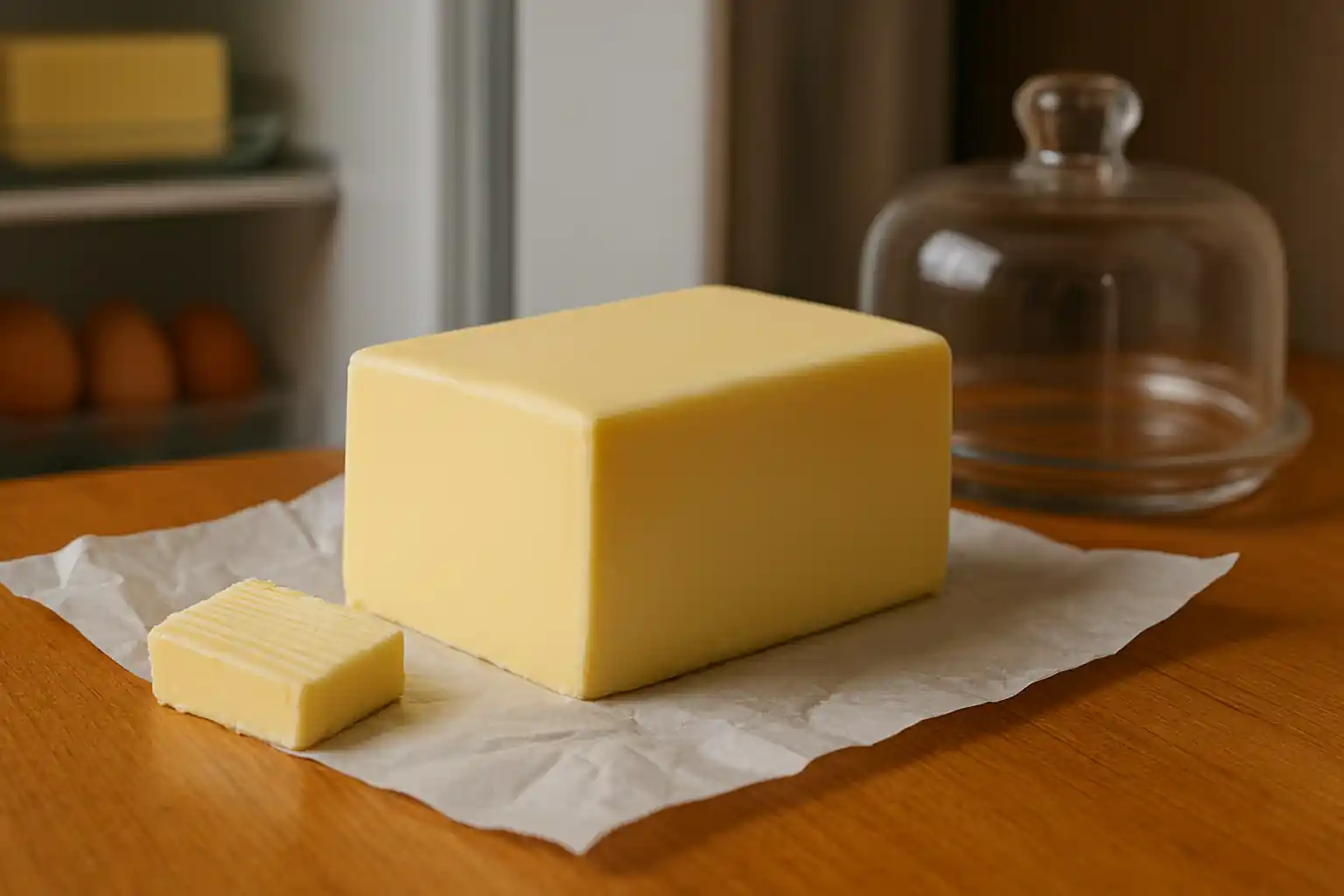Butter and Refrigeration: Do You Really Need to Refrigerate Butter?
Butter is one of those foods everyone loves, especially when spread on warm toast. But when it comes to storing butter, the big debate is whether to refrigerate butter or leave it out on the counter. Some say butter needs to be refrigerated to prevent it from going rancid, while others argue that leaving butter at room temperature keeps it soft and spreadable. In this article, we’ll explore whether butter really needs to be refrigerated, how long you can safely leave your butter out, and the differences between salted and unsalted butter storage.
This blog is worth reading because it combines science, food safety guidelines, and practical kitchen tips. By the end, you’ll know exactly how to keep butter in the fridge or on the counter without worrying if it will go bad.
What happens when you leave butter out on the counter?
When you leave butter out on the counter, it becomes soft and spreadable, perfect for warm toast or baking. A stick of butter left at room temperature softens as its milk fat structure relaxes. Many cooks enjoy having butter in a dish or covered butter container because it makes breakfast or cooking more convenient.
However, butter can go rancid if left exposed for too long. The milk solids, protein and water in butter, along with light and air, can trigger oxidation. This means that butter can go from fresh and creamy to rancid and unpleasant in taste. Whether butter can go bad depends on how long you leave your butter sitting out, the amount of salt it contains, and the overall fat content.
Does butter need to be refrigerated?
The big question is whether butter truly needs to be refrigerated. According to food safety experts, refrigeration slows spoilage and rancidity in dairy products. That said, salted butter contains natural preservative qualities, so many food writers note that it’s safe to leave butter at room temperature for several days.
If you want to store butter for a long shelf life, it’s better to keep it in the fridge. When you refrigerate butter, it resists oxidation and microbe contamination that might otherwise cause food spoilage. However, refrigeration also makes butter firm and difficult to spread, which is why some people prefer keeping a small portion unrefrigerated while keeping the rest back in the fridge.
Is salted butter safer than unsalted butter?
Salted butter tends to last much longer at room temp because the amount of salt acts as a preservative. Salt helps reduce the growth of microbes and slows down spoilage. That’s why a covered butter dish with salted butter is often considered safe to leave on the counter within a day or two.
On the other hand, unsalted butter lacks this preservative effect. Unsalted butter has a higher water content, which encourages microbial growth and makes it more likely to turn rancid. When it comes to butter safety, salted and unsalted types behave differently, which means that butter storage practices should adjust accordingly.
How long before butter will go bad at room temperature?
Butter will keep on the counter for a short period, but it depends on conditions. A safe estimate is that butter at room temperature will stay good for a day or two before spoilage risks increase. Factors like air, humidity, and light exposure make butter go bad faster.
If you use a butter keeper, butter bells, or a butter in a dish with some water seal, you can extend the time butter keeps without refrigeration. Still, butter can become rancid if left too long. To maximize shelf life, keep butter away from direct light and air and always cover it properly.
Can rancid butter make you sick?
The taste and smell of rancid butter are unpleasant, but rancid butter usually won’t make you sick immediately. That said, rancid butter contains oxidized fats that aren’t healthy if consumed regularly. Oxidation breaks down milk fat and can eventually cause food quality issues.
While rancid butter may not cause food poisoning, it’s still a sign of spoilage. Spoiled butter can harbor contamination from microbes if left out for too long. If butter tastes sour, smells off, or looks discolored, it’s best not to eat it. Even though rancid butter won’t make you sick right away, it’s better to be safe than sorry.
Tips for softening butter quickly without spoilage
Many people leave butter out for softening, but there are ways to get soft butter without risking spoilage. One trick is to cut a stick of butter into smaller pieces and let them sit at room temp for a few minutes. This way, butter softens faster without sitting out too long.
Another method is placing butter under a warm glass for quick softening butter. This keeps butter spreadable while reducing the time it spends unrefrigerated. If you want spreadable butter for your toast without waiting, you can also whip softened butter with oil to make it last much longer at room temperature.
Should you keep butter in the fridge or a butter dish?
When it comes to butter storage, you have options. You can keep butter in the fridge for long shelf life, or you can use a butter dish for convenience. Butter in the fridge is safe and reduces spoilage, but it becomes difficult to spread.
A butter dish or butter keeper allows you to leave butter soft while still covered. Covered butter prevents light and air exposure, which means that butter won’t spoil as quickly. The choice depends on whether you prefer convenience or maximum shelf life. If you want to store butter for weeks, refrigeration is best, but if you want soft butter daily, keeping a small portion unrefrigerated is safe to leave.
What is clarified butter (ghee), and why does it last longer?
Clarified butter, or ghee, has its milk solids and water content removed, leaving only pure butterfat. This makes ghee last much longer without refrigeration since it lacks the protein and water that encourage spoilage.
Unlike regular butter, ghee has a long shelf life because it doesn’t easily oxidize or become rancid. Many cultures use clarified butter because it can stay unrefrigerated for months without going bad. If you want to keep butter for cooking without worrying about spoilage, clarified butter or ghee is a great option.
How does salt, light, and air affect butter spoilage?
Salt acts as a natural preservative in butter, which is why salted butter lasts longer than unsalted butter. However, exposure to light and air accelerates oxidation and rancidity. This means that butter can go bad quickly if it’s left uncovered.
Light and air cause butter to oxidize, breaking down its milk fat and leading to rancidity. To prevent butter from turning rancid, always store butter in a covered butter container or wrapped in waxed paper. By minimizing oxidation and contamination, you extend butter’s shelf life and keep it fresh longer.
USDA guidelines on storing butter safely
According to the USDA, butter is considered a dairy product that benefits from refrigeration. While salted butter may be safe at room temperature for a short time, refrigeration ensures it stays fresh. The USDA recommends storing butter in the fridge for the longest shelf life and safety against contamination.
If you leave butter unrefrigerated, it’s best to keep butter covered and consume it within a day or two. While room-temperature butter won’t make you sick immediately, refrigeration is always safer. The USDA advice means that butter in the fridge lasts much longer, and you don’t have to worry about spoilage or rancidity.
Key Takeaways: How to Store Butter Safely
-
Butter can go bad if left exposed to air, light, and heat.
-
Salted butter lasts longer at room temperature than unsalted butter.
-
Rancid butter usually won’t make you sick but should not be eaten.
-
Keep butter in the fridge for long shelf life, but use a butter dish for short-term spreadability.
-
Clarified butter (ghee) has a long shelf life because it lacks milk solids and water.
-
Butter at room temperature is safe to leave for a day or two if covered properly.
-
USDA guidelines recommend refrigeration for butter safety and quality.

